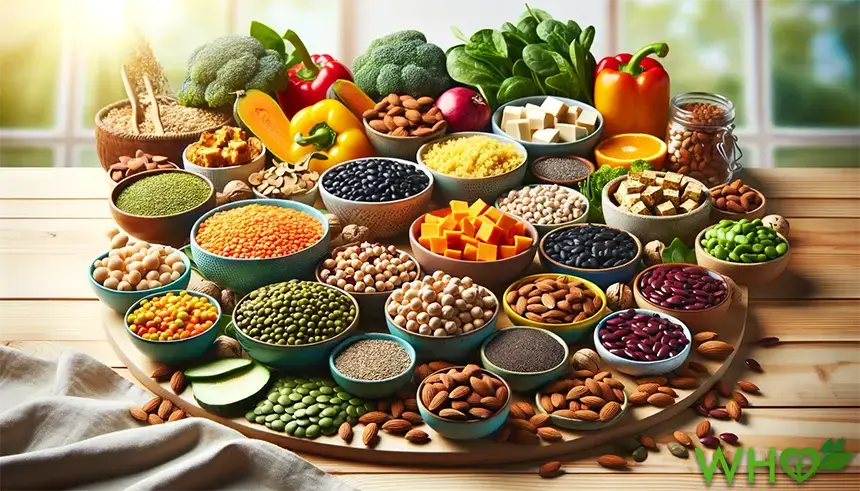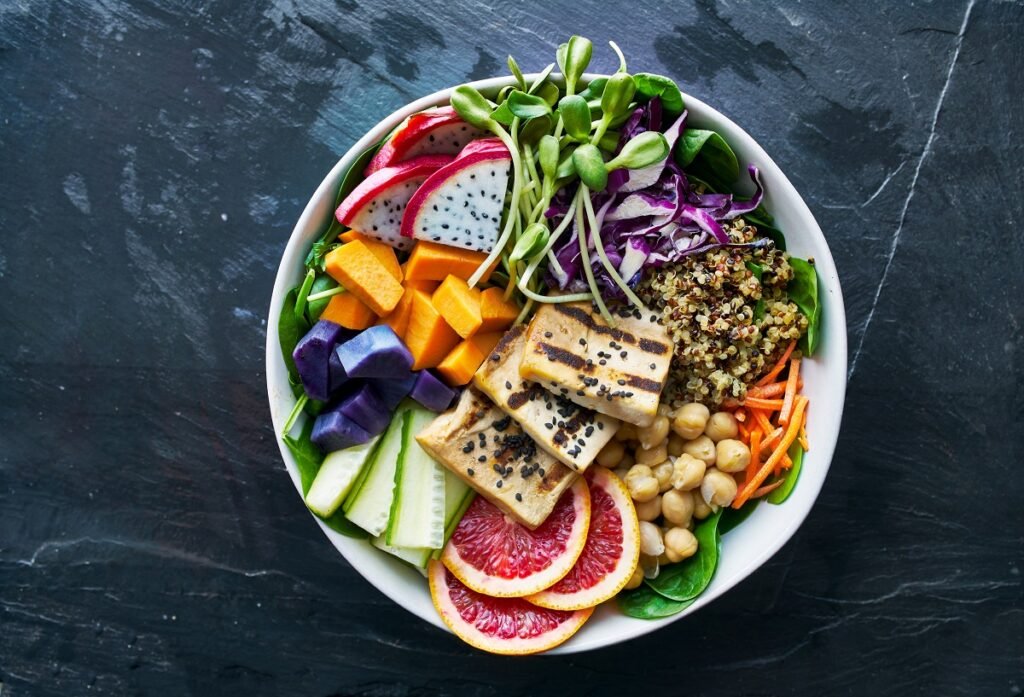Wellhealthorganic.com how protein can help you lose weight | Protein for weight loss
Protein
Protein is an important nutrient which is essential for our body. It helps increase our energy levels, helps in building muscles, and helps in weight control. Various studies and research have shown the good effect of protein intake in reducing weight. Protein can help you lose weight and belly fat, and it works through several different mechanisms. Here we will learn how protein can help in weight loss and why it is important for weight loss.

Protein: Effects on Weight Control Hormones
Your weight is actively controlled by your brain, specifically an area called the hypothalamus.
Your brain processes many different types of information to determine when and how much to eat.
Some of the most important signals to the brain are hormones that change in response to food.
A high protein intake actually increases levels of the satiety (appetite-reducing) hormones GLP-1, peptide YY and cholecystokinin, while reducing levels of your hunger hormone ghrelin.
By replacing carbs and fat with protein, you reduce hunger hormones and boost several satiety hormones.
This leads to a major reduction in appetite and this is the main reason why protein helps you lose weight. With this you can automatically eat less calories.
Here are some of the main hormones that protein affects:
- Insulin: Consuming protein improves insulin levels. Insulin is an important hormone that regulates blood sugar from food and affects fat storage in the body. Protein intake helps in controlling weight by keeping insulin levels balanced.
- Glucagon: This hormone controls blood sugar after eating and helps burn fat. Consuming protein improves glucagon levels, which helps in weight loss.
- Leptin: This hormone regulates appetite and reduces food cravings. Consuming protein changes leptin levels, making you feel less hungry and eat less.
Protein helps prevent muscle loss and metabolic slowdown
Protein helps prevent muscle loss and metabolic slowdown. Here is some detailed information:
- Muscle Building: Protein plays an important role in muscle building. It helps build various body systems, such as bones, ligaments, and tendons, keeping your muscles strong and healthy.
- Muscle preservation: Eating protein prevents your muscles from breaking down and helps you complete difficult or stressful tasks.
Help prevent metabolic slowdown:
- High-energy consumption: Due to the ecological impact of protein, high intake of it increases the body’s energy consumption. This increases the metabolic rate of the body and helps in preventing metabolic slowdown.
- Ecological impact of protein: Protein requires more energy to digest, which increases the body’s calorie consumption. This helps in reducing metabolic slowdown.
Overall, protein intake helps prevent muscle loss and prevents metabolic slowdown and reduces the chances of burning of unused fat.
Digesting and metabolizing protein burns calories.
Digesting and metabolizing proteins consumes calories. Energy is required to break down and use proteins in the body, which burns calories.
Digesting Protein: When you eat protein-rich food, the process of digesting protein starts in your body. In this process, proteins are broken down into smaller units that can be used by the body as residual energy. Calories are burnt in this process.
Metabolizing Protein: After being digested, the protein units produced are burned for use by the body, providing energy to the body. Calories are also burnt in this process.
This way, the body uses energy to digest and metabolize protein, which burns calories and helps with weight control. It should be part of a healthy diet and is important for achieving balanced energy.
Also Read This: Weight Loss in Monsoon: These 6 monsoon fruits can help in loss weight
How much protein is optimal?
Protein requirements depend on a person’s age, gender, weight, energy consumption, and physical activity. Here are the average protein requirements for generally healthy individuals:
- Generally, ideally, a person needs 0.8 grams of protein per kilogram of weight per day. This means that a person weighing 68 kilograms (150 pounds) needs about 55 grams of protein.
- For individuals who exercise: People who need more muscle or who exercise more need more protein. Such individuals may require 1.2-2.2 grams of protein per kilogram of weight per day.
- For intellectual performance: People who have less physical activity require less protein, but they also need protein.
It is important to note that protein needs depend on a person’s individual condition and goals, so it is best to consult a dietitian or physician. They can advise you about the right protein intake for your individual situation and needs.
Also Read This:
- Wellhealthorganic.com: weight loss in monsoon these 5 monsoon fruits can help you lose weight
- Wellhealthorganic.com: Vegetarian Protein Sources | Wellhealthorganic Ayush 2024
- wellhealthorganic high protein rich food for vegetarians to boost your health 2024
- Healthy Life Wellhealthorganic.com – You can Live it in 2024
- Wellhealthorganic.com: amazing beauty tips of ice cube will make you beautiful and young 2024
How protein can help you lose weight:
1. Protein satisfies and saves calories
Protein can help satisfy and save calories. This works in a few ways:
- Boosts energy consumption: Protein requires more energy to digest, which increases the body’s calorie consumption. Moreover, protein food is not just a calorie provider, but it also has quick and slow processes to provide vital energy and satiate energy.
- Controls appetite: Protein can help control appetite and keep you satisfied about meals for a longer period of time. It helps reduce the feeling of hunger and can suppress appetite for a long time even after a short period of eating.
- Boosts Metabolism: Consuming more protein can increase the rate of metabolism, which can increase your body’s calorie consumption.
2. IT’S CARBS high and low from protein
There are several main reasons why the amount of IT carbs (India Total Carbohydrates) can go high or low when eating protein:
- Availability of protein: Some protein sources, such as meat, fish, eggs, milk, etc., also come with IT carbs. So, if you get protein from these sources, you may be faced with more IT carbs.
- Residual carbohydrates: Many protein-rich diets may contain residual carbohydrates, which are consumed with protein. For example, cereals, porridge, and other nutritious foods eaten with protein contain IT carbs.
- Protein combination: In many meals, high-protein carbs are combined with protein, such as pulses and grains. These foods are blended to make them complete protein sources, but they also come with more carbs.
- Protein relativity: When you consume a protein-rich food, the relativity of your IT carbs intake may increase. This means you can consume more carbohydrates with your protein, which can increase your IT carbs intake.
3. It needs more of your energy
“Thermic effect of food” (TEF) is the energy we use to digest food into smaller, absorbable components. Protein has a higher TEF than carbs and fat which means you’re actually burning more calories to process protein than you are to process the other two.
4. Protein promotes FAT burning
It may be surprising, but it is a scientific fact that your body cannot effectively burn and use fat as energy if it does not get help from carbohydrates or protein. As you lose weight, your body loses both muscle and fat. It is especially important during this process that you continue to consume adequate protein in your diet. Getting enough protein from your diet helps burn fat while preserving lean muscle that burns calories.
5. Protein promotes muscle repair and growth
Your protein needs increase especially after intense exercise, so it is beneficial to increase your protein intake on the days you exercise. Additionally, if you strength train, consider having a high-protein snack right after a training session, when the muscle is sensitive to nutrients it can use to repair and grow.
One important thing to realize is that eating more protein alone will not help you lose excess weight in a healthy way. When consumed in excessive amounts, it can also lead to excessive weight gain such as eating excess carbs or fat, and may put unnecessary strain on the kidneys in the long run.
FAQs
How does protein help in losing weight?
Eating protein reduces appetite and increases metabolic rate, which helps in weight loss. Additionally, protein helps preserve muscle mass, which helps your body consume more energy.
Which type of protein is best for losing weight?
While choosing the best protein, you should choose nutritious food along with proper nutrition, such as pulses, meat, eggs, milk etc. These sources provide you with satiety and energy and can help in weight loss.
What is special about protein that is different from other nutrients in weight loss?
One feature of protein is that it helps reduce appetite and increases energy consumption, thereby reducing weight. Additionally, protein helps preserve muscle, which is important in weight loss.
Should the timing of protein intake be changed to lose weight?
To lose weight, the time of protein intake should be carefully selected. The best time to consume protein is before and after meals, which reduces appetite and increases metabolism.
Can protein be consumed along with yoga and exercise?
Consuming protein along with yoga and exercise builds body muscles, which helps in your weight loss goal.
-

Wellhealthorganic.com: weight loss in monsoon these 5 monsoon fruits can help you lose weight
-
Wellhealthorganic.com: Vegetarian Protein Sources | Wellhealthorganic Ayush 2024
-

wellhealthorganic high protein rich food for vegetarians to boost your health 2024
-
Healthy Life Wellhealthorganic.com – You can Live it in 2024


